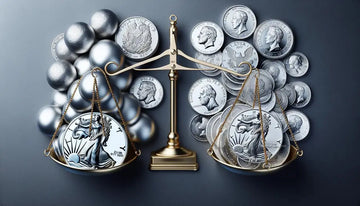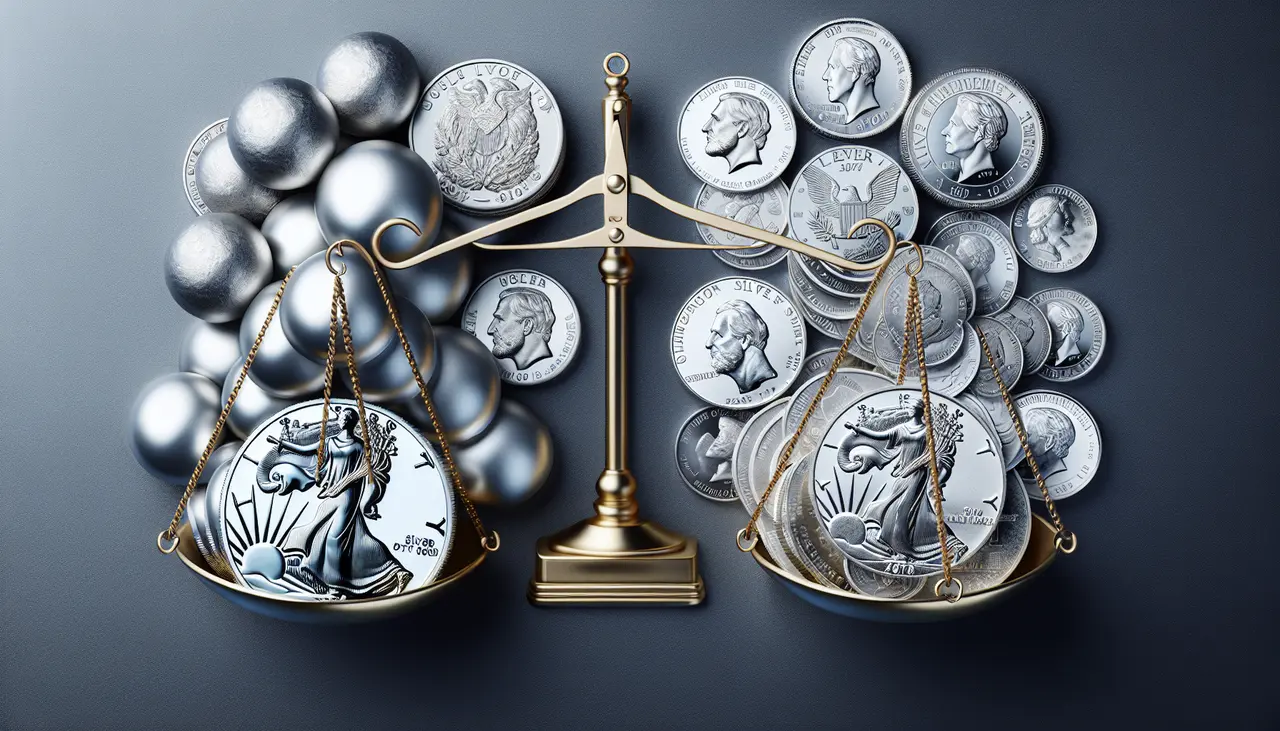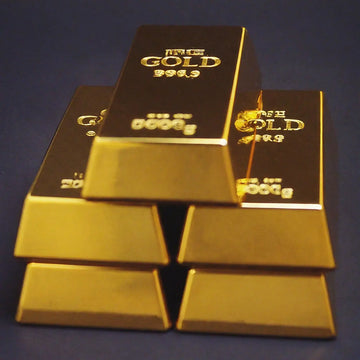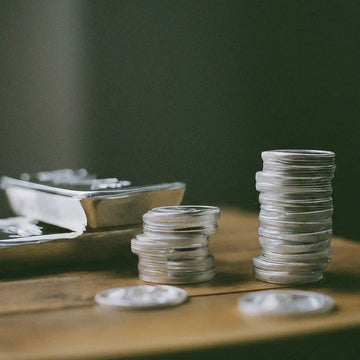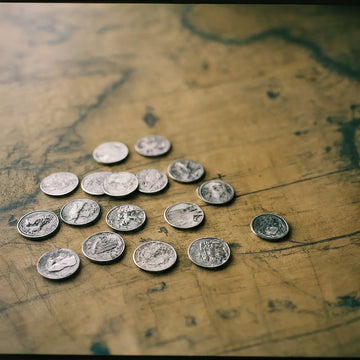Introduction to Silver Rounds and Coins
Silver rounds and coins might seem similar at first glance, but they have key differences that can impact an investor’s decision. Silver rounds are just that - round pieces of silver. They are not legal tender, which means you can’t use them to buy stuff. They’re made by private mints, not governments, and usually cost less than silver coins because they’re cheaper to make. On the other hand, silver coins are official currency produced by governments. They can be used as money and often carry a face value. Along with the silver content, coins have collectible value because of their design, history, and rarity. Investors like silver coins for their potential to increase in value over time. Whether you choose rounds or coins depends on your goals. If you want pure silver for the least money, rounds are a good choice. If you’re into collecting and potential long-term value, coins might be more up your alley.
What Are Silver Rounds?
Silver rounds might sound like fancy coins, but there’s a key difference. While silver coins are legal tender, issued by governments, and often carry a face value, silver rounds do not. Instead, silver rounds are privately minted. They’re essentially round pieces of metal with a specified weight of pure silver. Think of them as the no-frills cousins of silver coins; they’re all about the silver content, not about being used to buy a coffee or a snack. Silver rounds come in various designs, often reflecting themes like historical events, famous figures, or even popular culture, but their value lies in their silver content, not in any collectible or legal tender value. They’re a favorite among investors who want pure silver without paying extra for the numismatic or collectible value that coins carry. So, if you’re eyeing silver as an investment, silver rounds offer a straightforward path to owning this precious metal.
The Appeal of Silver Coins for Investors
Silver coins hold a special allure for investors. Unlike silver rounds, coins come with a face value and are minted by government treasuries, adding a layer of trust and legitimacy. This isn’t just about owning silver; it’s about owning a piece of history and government-backed authenticity. Collectors and investors often favor silver coins for their potential to increase in value over time, not just from the rising price of silver, but also from their collectibility and limited mintages. Think of it like this - you’re not just buying silver, you’re buying a story, a piece of art, and potentially, a rare item that could become more valuable as time goes by. Plus, silver coins like the American Silver Eagle or the Canadian Silver Maple Leaf are recognized worldwide, making them easier to trade or sell. In simple terms, you get the combo of silver investment and the potential for collectible value, which rounds just can’t match.
Key Differences Between Silver Rounds and Coins
When you’re eyeing silver as an investment or collectible, understanding what sets silver rounds apart from coins is crucial. To start, silver coins are legal tender, backed by a government, and their value isn’t just in the metal they’re made of but also in their legal value. Think U.S. Silver Eagles or Canadian Maple Leafs; they come with a face value and are recognized worldwide. On the flip side, silver rounds are purely a private affair. They’re produced by private mints, not for spending but for investment or collection. Their worth hinges solely on the metal’s market value and, sometimes, the rarity or design.
Here’s a quick breakdown:
- Legal status: Coins are legal tender; rounds are not.
- Authority: Governments mint coins; private mints make rounds.
- Value: Coins have face value plus metal value; rounds ride on metal value.
- Collectibility: Coins often have historical or legal significance, boosting collectibility. Rounds cater to themes or designs that appeal to individual tastes.
In essence, if you’re hunting for something with legal backing and potential numismatic value, silver coins are your go-to. But if pure silver content at a potentially lower cost speaks to you, rounds should be in your sights. Both have their place in a savvy investor’s portfolio, depending on your goals and interests.
Pros and Cons of Investing in Silver Rounds
When deciding on investing in silver rounds, you’re looking at a less traditional but popular choice. Silver rounds are basically coins, but they don’t carry any legal tender status. This difference brings us to the pros and cons of investing in them. Starting with the pros, silver rounds usually come with a lower premium over the spot price of silver compared to coins. This means you’re getting more silver for your dollar, making it an appealing option for those looking to maximize their investment in the physical metal itself. Moreover, rounds offer a wide variety of designs, thanks to fewer restrictions in their creation. This can make them more attractive to collectors and investors who enjoy diversity in their portfolios.
On the downside, because rounds are not legal tender, they might be less recognizable to the general public. This could potentially make them harder to sell in a pinch compared to government-issued silver coins, which are widely recognized and trusted. Another con is that rounds do not usually come with the same level of historical or collectible value that some legal tender silver coins have. While this might not affect the silver content’s value, it could limit the potential for gains based on rarity, demand, and collectible value.
So, if your main goal is to get as much silver as possible for your investment, and you’re less concerned about the collectibility or immediate liquidity, silver rounds could be a great option. However, if you value the added security and potential for collectible appreciation that comes with government-minted coins, you might want to weigh those factors carefully.
Pros and Cons of Investing in Silver Coins
Silver coins carry a bit more glam than your average silver rounds. One big reason? They’re often minted by governments, meaning they’re legal tender. You can actually spend them, though you probably wouldn’t want to. Imagine paying for groceries with a slice of history or an artwork in your wallet. Now, invest in silver coins, and you’re also banking on collector’s value, not just the metal’s worth. However, it’s not all shiny and simple.
The downside? Cost. Silver coins almost always demand a higher price than silver rounds. Why? Two reasons: collectibility and minting costs. Coins have history, artistry, and a bit of ego involved. Governments don’t just pump these out; they craft them. That craft, plus the coin’s potential rarity, pumps the price.
But there’s a catch beyond cash. The market for silver coins can be volatile. Sure, they may gain value as collectibles, but that’s a rocky road with no guarantees. If the collectible market dips, so does your investment. Plus, not all coins age like fine wine. Some might not grow in value as you hope, turning what seemed like a wise investment into a fancy paperweight.
To sum it up, investing in silver coins might be attractive for those intrigued by the blend of history, craftsmanship, and investment. Still, it’s crucial to weigh the higher initial cost and the unpredictability of their future value against the tactile history and potential for collector’s interest.
Factors to Consider Before Buying Silver Rounds or Coins
When you’re thinking about putting your money into silver, you’ve got two main choices: rounds or coins. Now, deciding between them isn’t just about flipping a coin. You’ve got to consider a few key factors. First off, purity is a big deal. Most silver coins and rounds boast .999 fine silver, but always double-check. Next up, cost. Rounds usually cost less than coins because they don’t carry the same collectible value. However, don’t just look at the sticker price; think about long-term value too.
Legal tender status is another important point. Coins are legal tender, meaning they’re produced by a government mint and carry a face value. Rounds, on the other hand, are produced by private mints and are not legal tender. This might not seem like a big deal at first glance, but it impacts their collectibility and potential future value.
Also, consider design and collectibility. Coins often feature historic or cultural designs, which can make them more desirable to collectors down the line. Rounds tend to have more generic designs, although some are pretty unique. If you’re eyeing future resale value, coins might edge out rounds in this area.
Lastly, mull over liquidity. Coins, especially those from well-known mints like the U.S. Mint or Royal Canadian Mint, are generally easier to sell because they’re recognized and trusted worldwide.
Bottom line? Think about why you’re buying silver in the first place. If it’s purely for the metal value and you’re watching your budget, silver rounds could be your best bet. But if you’re fascinated by the collectible aspect and don’t mind spending a bit more for something that potentially holds greater value over time, coins might be where it’s at.
How to Start Investing in Silver Rounds and Coins
Starting your investment journey with silver rounds and coins is simpler than it might seem at first. You begin by setting a budget. How much are you willing to spend? Remember, it’s best to start small, especially if you’re new. Once you have a budget, decide whether you’re leaning more towards silver rounds or coins. Rounds are generally cheaper and don’t carry the collectible value that coins do, which often makes them a more straightforward investment in terms of silver content per dollar spent. Coins, on the other hand, can carry additional value based on rarity, design, and historical significance, but this also means they might be pricier.
Next, find a reputable dealer. Look for dealers with positive reviews, a good track record, and transparency in their pricing. Avoid anyone pushing you towards items you don’t want or those offering deals that seem too good to be true—they usually are.
Then, think about storage. Will you keep your silver at home, or are you considering a safety deposit box? Your storage choice should factor in safety, accessibility, and cost.
Finally, diversify. Don’t put all your money into one type of silver coin or round. Mix it up. Different types of coins and rounds will react differently to market changes, spreading your risk.
Remember, investing in silver should be a part of a larger investment strategy. Silver can be a safe haven during times of economic uncertainty, but it’s also subject to market fluctuations like any other asset. Keep learning, stay informed about the market, and adjust your strategy as needed.
Storage and Security for Your Silver Investments
Stashing your silver safely is crucial, whether you opt for rounds or coins. Think of it as protecting your hard-earned money. Both silver rounds and coins attract attention from the wrong crowd because they hold value. So, where do you keep them safe? A home safe is a popular choice for many. It’s convenient, but make sure it’s bolted down. Another smart move is to use a safety deposit box in a bank. It offers extra security and peace of mind, knowing your investment is under lock and key away from your home. Also, consider insurance. Whether stored at home or in a bank, getting your silver insured adds a layer of protection. Remember, the goal is to keep your investment secure, so weigh your options carefully.
Conclusion and Final Thoughts on Silver Investment Choices
Deciding between investing in silver rounds and coins comes down to your goals and what you value most. If your focus is solely on the value of the silver, rounds might be your best bet. They’re generally cheaper and mirror the market price of silver more closely than coins do. However, if you’re drawn to the allure of collecting and the potential for historical value, coins hold an edge. They offer aesthetic appeal, historical significance, and might even gain value over time based on rarity and demand. Remember, the world of silver investing is vast. Whether you lean towards rounds or coins, make sure to research, stay informed, and choose what aligns with your investment strategy. Whichever path you choose, silver can be a shiny addition to diversify your portfolio.

